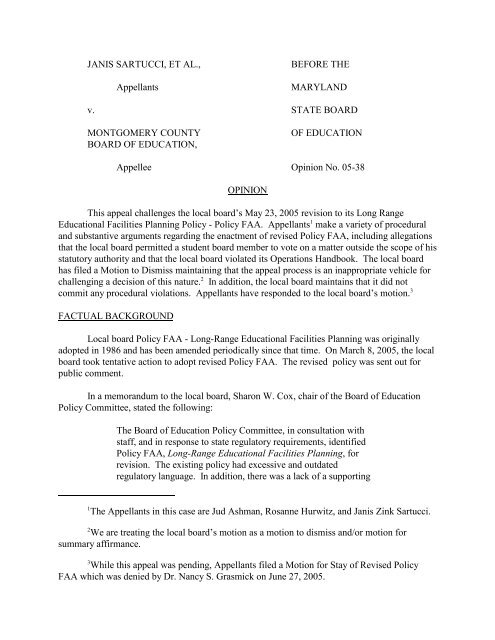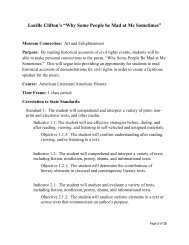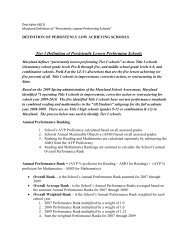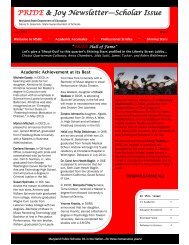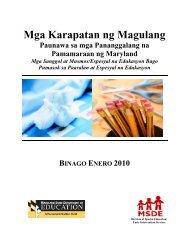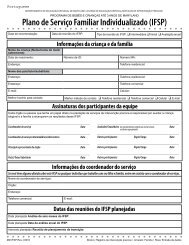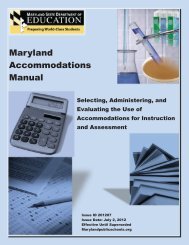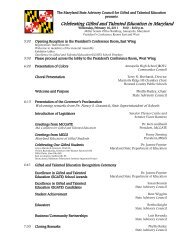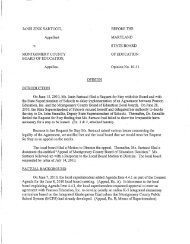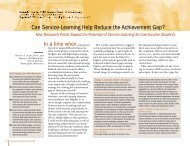The Appellants in this case are Jud Ashman, Rosanne Hurwitz, and ...
The Appellants in this case are Jud Ashman, Rosanne Hurwitz, and ...
The Appellants in this case are Jud Ashman, Rosanne Hurwitz, and ...
You also want an ePaper? Increase the reach of your titles
YUMPU automatically turns print PDFs into web optimized ePapers that Google loves.
JANIS SARTUCCI, ET AL.,<br />
<strong>Appellants</strong><br />
BEFORE THE<br />
MARYLAND<br />
v. STATE BOARD<br />
MONTGOMERY COUNTY<br />
BOARD OF EDUCATION,<br />
OF EDUCATION<br />
Appellee Op<strong>in</strong>ion No. 05-38<br />
OPINION<br />
This appeal challenges the local board’s May 23, 2005 revision to its Long Range<br />
1<br />
Educational Facilities Plann<strong>in</strong>g Policy - Policy FAA. <strong>Appellants</strong> make a variety of procedural<br />
<strong>and</strong> substantive arguments regard<strong>in</strong>g the enactment of revised Policy FAA, <strong>in</strong>clud<strong>in</strong>g allegations<br />
that the local board permitted a student board member to vote on a matter outside the scope of his<br />
statutory authority <strong>and</strong> that the local board violated its Operations H<strong>and</strong>book. <strong>The</strong> local board<br />
has filed a Motion to Dismiss ma<strong>in</strong>ta<strong>in</strong><strong>in</strong>g that the appeal process is an <strong>in</strong>appropriate vehicle for<br />
2<br />
challeng<strong>in</strong>g a decision of <strong>this</strong> nature. In addition, the local board ma<strong>in</strong>ta<strong>in</strong>s that it did not<br />
commit any procedural violations. <strong>Appellants</strong> have responded to the local board’s motion. 3<br />
FACTUAL BACKGROUND<br />
Local board Policy FAA - Long-Range Educational Facilities Plann<strong>in</strong>g was orig<strong>in</strong>ally<br />
adopted <strong>in</strong> 1986 <strong>and</strong> has been amended periodically s<strong>in</strong>ce that time. On March 8, 2005, the local<br />
board took tentative action to adopt revised Policy FAA. <strong>The</strong> revised policy was sent out for<br />
public comment.<br />
In a memor<strong>and</strong>um to the local board, Sharon W. Cox, chair of the Board of Education<br />
Policy Committee, stated the follow<strong>in</strong>g:<br />
<strong>The</strong> Board of Education Policy Committee, <strong>in</strong> consultation with<br />
staff, <strong>and</strong> <strong>in</strong> response to state regulatory requirements, identified<br />
Policy FAA, Long-Range Educational Facilities Plann<strong>in</strong>g, for<br />
revision. <strong>The</strong> exist<strong>in</strong>g policy had excessive <strong>and</strong> outdated<br />
regulatory language. In addition, there was a lack of a support<strong>in</strong>g<br />
1<br />
<strong>The</strong> <strong>Appellants</strong> <strong>in</strong> <strong>this</strong> <strong>case</strong> <strong>are</strong> <strong>Jud</strong> <strong>Ashman</strong>, <strong>Rosanne</strong> <strong>Hurwitz</strong>, <strong>and</strong> Janis Z<strong>in</strong>k Sartucci.<br />
2<br />
We <strong>are</strong> treat<strong>in</strong>g the local board’s motion as a motion to dismiss <strong>and</strong>/or motion for<br />
summary affirmance.<br />
3<br />
While <strong>this</strong> appeal was pend<strong>in</strong>g, <strong>Appellants</strong> filed a Motion for Stay of Revised Policy<br />
FAA which was denied by Dr. Nancy S. Grasmick on June 27, 2005.
implement<strong>in</strong>g regulation. <strong>The</strong>se factors, comb<strong>in</strong>ed with state<br />
regulatory changes, necessitated the policy revision. <strong>The</strong> proposed<br />
revision del<strong>in</strong>eates the Board’s commitment to a long-range<br />
educational facilities plann<strong>in</strong>g process that addresses chang<strong>in</strong>g<br />
enrollment patterns <strong>and</strong> susta<strong>in</strong>s high quality educational programs,<br />
while cont<strong>in</strong>u<strong>in</strong>g extensive opportunities for <strong>in</strong>put from p<strong>are</strong>nts<br />
<strong>and</strong> the public throughout the process.<br />
<strong>The</strong> Board of Education Policy Committee met on April 21 <strong>and</strong> May 11, 2005. At those<br />
meet<strong>in</strong>gs the Committee engaged <strong>in</strong> discussion of the proposed policy <strong>and</strong> concerns raised <strong>in</strong> the<br />
public comments. Based on the public comments, the Committee recommended additional<br />
revisions to the policy. <strong>The</strong> additional revisions were posted with the local board’s meet<strong>in</strong>g<br />
agenda approximately one week before the local board’s May 23, 2005 meet<strong>in</strong>g.<br />
At its May 23 meet<strong>in</strong>g, a resolution to approve the Policy Committee’s revised policy was<br />
placed on the table <strong>and</strong> was debated by the board members. Several amendments were offered<br />
<strong>and</strong> voted on. Ultimately, the local board adopted Policy FAA as it now exists. <strong>The</strong> local board<br />
also resolved that the super<strong>in</strong>tendent develop a regulation support<strong>in</strong>g the cont<strong>in</strong>uation of the<br />
facilities plann<strong>in</strong>g process identified <strong>in</strong> Policy FAA, recodify<strong>in</strong>g the procedures of the superceded<br />
policy to serve as an <strong>in</strong>terim regulation. In addition, the local board resolved that the<br />
super<strong>in</strong>tendent establish a broad-based representative stakeholder workgroup to review the<br />
support<strong>in</strong>g regulation for Policy FAA.<br />
St<strong>and</strong>ard of Review<br />
Because <strong>this</strong> appeal <strong>in</strong>volves a decision of the local board <strong>in</strong>volv<strong>in</strong>g a local policy, the<br />
local board’s decision is considered prima facie correct, <strong>and</strong> the State Board may not substitute<br />
its judgment for that of the local board unless the decision is arbitrary, unreasonable, or illegal.<br />
COMAR 13A.01.05.03E(1).<br />
To the extent that an issue raised <strong>in</strong> the appeal requires an <strong>in</strong>terpretation of law, however,<br />
§ 2-205(e) of the Education Article provides that the State Board, without charge <strong>and</strong> with the<br />
advice of the Attorney General, shall expla<strong>in</strong> the true <strong>in</strong>tent <strong>and</strong> mean<strong>in</strong>g of the provisions of the<br />
Education Article that perta<strong>in</strong> to public schools <strong>and</strong> public school systems <strong>in</strong> Maryl<strong>and</strong> <strong>and</strong> the<br />
rules <strong>and</strong> regulations adopted by the State Board. By regulation found at COMAR<br />
13A.01.05.05E, the st<strong>and</strong>ard of review that the State Board applies when it is <strong>in</strong>terpret<strong>in</strong>g school<br />
laws <strong>and</strong> regulations is that:<br />
<strong>The</strong> State Board shall exercise its <strong>in</strong>dependent judgment on the record before it <strong>in</strong><br />
the explanation <strong>and</strong> <strong>in</strong>terpretation of the public school laws <strong>and</strong> State Board<br />
regulations.<br />
2
ANALYSIS<br />
Procedural Allegations<br />
Student Board Member Vote<br />
<strong>Appellants</strong> argue that the local board permitted its student member to vote on revisions to<br />
Policy FAA <strong>in</strong> violation of §3-901(e)(6) of the Education Article, <strong>and</strong> that <strong>this</strong> illegal vote was<br />
the tie breaker for pass<strong>in</strong>g the revisions. Section 3-901(e)(6) provides that the student member<br />
shall vote on all matters except those relat<strong>in</strong>g to suspension or dismissal of teachers, pr<strong>in</strong>cipals,<br />
<strong>and</strong> other professional personnel; collective barga<strong>in</strong><strong>in</strong>g; capital <strong>and</strong> operat<strong>in</strong>g budgets; <strong>and</strong> school<br />
4<br />
clos<strong>in</strong>gs, reopen<strong>in</strong>gs, <strong>and</strong> boundaries. <strong>Appellants</strong> ma<strong>in</strong>ta<strong>in</strong> that the student board member voted<br />
on a matter related to school clos<strong>in</strong>gs, reopen<strong>in</strong>gs, <strong>and</strong> boundaries. <strong>The</strong> local board argues <strong>in</strong><br />
response that the student board member voted on a matter of policy with<strong>in</strong> the category of<br />
matters on which the student member shall vote.<br />
Because <strong>this</strong> issue <strong>in</strong>volves an <strong>in</strong>terpretation of law, we shall exercise our <strong>in</strong>dependent<br />
judgment <strong>in</strong> reach<strong>in</strong>g a decision. <strong>The</strong> start<strong>in</strong>g po<strong>in</strong>t <strong>in</strong> our analysis is <strong>in</strong>terpretation of the<br />
relevant statute. In <strong>this</strong> regard, the card<strong>in</strong>al rule of statutory construction is to ascerta<strong>in</strong> <strong>and</strong> carry<br />
out the <strong>in</strong>tent of the legislature. See McDonald v. State, 141 Md. App. 372, 377-378 (2001),<br />
rely<strong>in</strong>g on Langston v. Langston, 366 Md. 490, 508 (2001); Bd. of License Comm’rs v. Toye, 354<br />
Md. 116 (1999); Oaks v. Connors, 339 Md. 24 (1995). Generally, we beg<strong>in</strong> “with the words of<br />
the statute, <strong>and</strong> give those words their pla<strong>in</strong> mean<strong>in</strong>g. Id. When “the statute is not ambiguous,<br />
we end our <strong>in</strong>quiry <strong>and</strong> allow the pla<strong>in</strong> mean<strong>in</strong>g of the statute to govern <strong>in</strong>terpretation.” Mart<strong>in</strong><br />
v. Beverage Capital Corp., 353 Md. 388, 399 (1999). Even where the language of a statute is<br />
clear <strong>and</strong> unambiguous, we can look elsewhere to div<strong>in</strong>e legislative <strong>in</strong>tent. Bla<strong>in</strong>e v. Bla<strong>in</strong>e, 226<br />
Md. 49, 64-65 (1994). In ascerta<strong>in</strong><strong>in</strong>g the purpose of a statute, material that fairly bears on the<br />
fundamental issue of legislative purpose or goal may be considered. Schuman, Kane, Felts &<br />
Evergam, Chartered v. Aluisi, et al., 341 Md. 115, 119 (1995).<br />
<strong>The</strong> issue here is whether or not the student member’s vote was a vote on a matter<br />
relat<strong>in</strong>g to school clos<strong>in</strong>gs, reopen<strong>in</strong>gs, <strong>and</strong> boundaries. In consider<strong>in</strong>g the plan mean<strong>in</strong>g of the<br />
th<br />
statute, we focused on the term “matter.” Blacks Law Dictionary, 999 (8 ed. 2004), def<strong>in</strong>es<br />
“matter” as “a subject under consideration, esp. <strong>in</strong>volv<strong>in</strong>g a dispute or litigation.” Given that<br />
def<strong>in</strong>ition, we looked to the particularity of the issue on which the student voted. Here, the vote<br />
by the student board member was not a vote on a set of specific factual circumstances as there<br />
was no live <strong>case</strong> or controversy at issue <strong>and</strong> no specific question perta<strong>in</strong><strong>in</strong>g to any particular<br />
school clos<strong>in</strong>g, school reopen<strong>in</strong>g or a boundary adjustment. Rather, the vote concerned a<br />
generalized policy on the school system’s long-range plann<strong>in</strong>g process for school facilities <strong>in</strong><br />
4<br />
Section 3-901(e)(7) allows a local board to determ<strong>in</strong>e by majority vote on a <strong>case</strong> by <strong>case</strong><br />
basis whether a matter under consideration is covered by the exclusionary provisions of (e)(6).<br />
<strong>The</strong>re is no <strong>in</strong>dication that the local board did so <strong>in</strong> <strong>this</strong> <strong>in</strong>stance, however.<br />
3
order to address chang<strong>in</strong>g enrollment while susta<strong>in</strong><strong>in</strong>g high quality educational programs without<br />
application to any set of facts. Certa<strong>in</strong>ly, the policy <strong>in</strong>cludes the words “clos<strong>in</strong>gs, reopen<strong>in</strong>gs,<br />
<strong>and</strong> boundaries,” but, we conclude that is not dispositive here. <strong>The</strong>refore, look<strong>in</strong>g to the pla<strong>in</strong><br />
language of the statute, we f<strong>in</strong>d that the student board member’s vote on Policy FAA was<br />
permissible.<br />
<strong>The</strong> legislative history of the statute supports that conclusion. Specifically, it was House<br />
Bill 1205, passed by the General Assembly <strong>in</strong> 1989, that granted limited vot<strong>in</strong>g powers to the<br />
student member of the Montgomery County Board of Education. In the testimony concern<strong>in</strong>g<br />
that bill, the Montgomery County Board of Education stated that the vot<strong>in</strong>g rights of the student<br />
board member were limited so that the student member would not vote on issues where pressure<br />
from the electorate could be <strong>in</strong>tense or where certa<strong>in</strong> personnel matters were <strong>in</strong>volved. (See<br />
Position Statement of Montgomery County Board of Education, March 1989). Such pressure is<br />
more likely where there is a set of specific factual circumstances rather than where a generalized<br />
policy is at issue.<br />
That the policy at issue here is a generalized one is beyond question. It is process<br />
oriented <strong>and</strong> generic. For example, the policy states that there will be a “Plan for utilization of<br />
schools . . .,” that it will allow “a constructive <strong>and</strong> collaborative advisory role . . .,” that there will<br />
be a “six-year capital improvements program” that will set forth when new schools <strong>are</strong> needed,<br />
when modernization is needed, <strong>and</strong> when school closures <strong>are</strong> appropriate. (See Policy FAA<br />
attached hereto). <strong>The</strong> policy itself does not def<strong>in</strong>e the specific facts <strong>and</strong> circumstances that<br />
would lead to any of those outcomes.<br />
Because we f<strong>in</strong>d that pressure related to specific controversies is the type of pressure from<br />
which the General Assembly <strong>in</strong>tended to <strong>in</strong>sulate the student board member of the Montgomery<br />
County Board of Education, we conclude that a student board member’s vote on a general policy<br />
is appropriate. Moreover, <strong>in</strong> <strong>this</strong> <strong>case</strong>, some of the changes to which <strong>Appellants</strong> object concern<br />
procedural matters which the local board <strong>in</strong>tends to place <strong>in</strong> the regulation implement<strong>in</strong>g the<br />
policy. Thus, even if there may be circumstances <strong>in</strong> which a student board member’s vote on a<br />
general policy could make that student member susceptible to undue pressure from third parties,<br />
<strong>this</strong> situation does not rise to that level.<br />
Local Board Operations H<strong>and</strong>book<br />
<strong>Appellants</strong> also ma<strong>in</strong>ta<strong>in</strong> that the local board failed to follow various provisions <strong>in</strong> the<br />
local board’s Operations H<strong>and</strong>book dur<strong>in</strong>g its discussion of Policy FAA revisions at its May 23,<br />
2005 meet<strong>in</strong>g. <strong>Appellants</strong> refer to the Ethics Section of the Operations H<strong>and</strong>book which lists<br />
several pr<strong>in</strong>ciples adopted by the local board to reflect its commitment to work together as a<br />
board. Among the listed factors <strong>are</strong> (1) respect<strong>in</strong>g <strong>in</strong>dividual differences <strong>and</strong> op<strong>in</strong>ions <strong>and</strong> be<strong>in</strong>g<br />
open-m<strong>in</strong>ded; (2) disagree<strong>in</strong>g on issues without mak<strong>in</strong>g it personal; <strong>and</strong> (3) ma<strong>in</strong>ta<strong>in</strong><strong>in</strong>g<br />
professional decorum dur<strong>in</strong>g board meet<strong>in</strong>gs. <strong>Appellants</strong> make generalized claims that the board<br />
meet<strong>in</strong>g “lacked respect for the <strong>in</strong>dividuals <strong>and</strong> groups that have commented on the proposed<br />
4
changes to Policy FAA.” <strong>Appellants</strong> offer no evidentiary support for their claims. Moreover, the<br />
fact that <strong>Appellants</strong> may be unhappy with comments allegedly made by local board members is<br />
an <strong>in</strong>sufficient basis for challeng<strong>in</strong>g the revisions to Policy FAA.<br />
<strong>Appellants</strong> further ma<strong>in</strong>ta<strong>in</strong> that the local board voted to approve revisions to Policy FAA<br />
that it had never seen before its May 23 meet<strong>in</strong>g. Although not explicitly stated, <strong>this</strong> reference<br />
appears to be to the Policy Development <strong>and</strong> Adoption Section of the Operations H<strong>and</strong>book<br />
which states that “[a]ny resolution <strong>in</strong>troduced which <strong>in</strong>volves a matter of policy shall lie on the<br />
table for at least one week before be<strong>in</strong>g voted upon.” In response, the local board ma<strong>in</strong>ta<strong>in</strong>s that<br />
while <strong>this</strong> provision required the proposed policy to be tabled for at least one week before be<strong>in</strong>g<br />
voted upon, it did not prohibit a vote on amendments to the draft policy which was already<br />
tabled.<br />
On March 8, 2005, the local board took tentative action to adopt revised Policy FAA.<br />
<strong>The</strong> revised policy was sent out for public comment <strong>and</strong> seventy-five comments were received.<br />
<strong>The</strong> local board’s Policy Committee discussed changes to the policy based upon the public<br />
comments <strong>and</strong> presented a revised draft to the local board members <strong>in</strong> advance of the May 23<br />
meet<strong>in</strong>g. Local board members proposed amendments to the revised draft at the May 23 meet<strong>in</strong>g<br />
<strong>and</strong> ultimately adopted the policy with various revisions at the same meet<strong>in</strong>g. We concur with<br />
the local board’s <strong>in</strong>terpretation <strong>and</strong> believe that the above process complies with the Operations<br />
H<strong>and</strong>book. Appellant’s <strong>in</strong>terpretation of the provision at issue would place the local board <strong>in</strong><br />
circumstances where any previously tabled policy decision could not be altered <strong>in</strong> any way<br />
without first be<strong>in</strong>g tabled aga<strong>in</strong> for the specified time period. Such an <strong>in</strong>terpretation would<br />
prevent the local board from conduct<strong>in</strong>g its bus<strong>in</strong>ess <strong>in</strong> an efficient manner.<br />
Substantive Allegations<br />
<strong>Appellants</strong> present a myriad of other claims. <strong>The</strong>se claims <strong>are</strong> substantive attacks on<br />
Policy FAA. For example, <strong>Appellants</strong>’ substantive allegations <strong>in</strong>clude: (1) that the revised policy<br />
5<br />
fails to establish procedures to govern school clos<strong>in</strong>gs as required by State regulation; (2) that<br />
the local board failed to adequately address citizen <strong>and</strong> organizational concerns regard<strong>in</strong>g the<br />
revisions; (3) that various items <strong>in</strong> the old policy have been elim<strong>in</strong>ated from the revised policy;<br />
<strong>and</strong> (4) that there is no basis for the local board to transfer portions of the old policy <strong>in</strong>to<br />
5<br />
Although <strong>this</strong> matter does not require address<strong>in</strong>g <strong>Appellants</strong>’ claim that the revised<br />
policy fails to establish school clos<strong>in</strong>g procedures, we note that the claim lacks merit. While<br />
COMAR 13A.02.09.01 requires each local board to establish school clos<strong>in</strong>g procedures which<br />
ensure that consideration is given to various listed factors, there is noth<strong>in</strong>g <strong>in</strong> State law or<br />
regulation that requires such procedures to be set forth <strong>in</strong> any particular written policy of the<br />
local board. Nevertheless, Policy FAA states that the long-range facilities plann<strong>in</strong>g process will<br />
provide a process for clos<strong>in</strong>g <strong>and</strong> consolidat<strong>in</strong>g schools that meets COMAR requirements, see<br />
Revised Policy FAA at C.7, <strong>and</strong> the local board has <strong>in</strong>dicated that the school clos<strong>in</strong>g procedures<br />
that were previously <strong>in</strong>cluded <strong>in</strong> Policy FAA will be placed <strong>in</strong> regulation.<br />
5
egulation.<br />
<strong>The</strong> State Board has previously held that <strong>in</strong>dividuals may not use the adm<strong>in</strong>istrative<br />
appeal process set forth <strong>in</strong> §4-205 of the Education Article to challenge a policy-mak<strong>in</strong>g decision<br />
of a local board of education. See Montgomery v. Howard County Board of Education, MSBE<br />
Op<strong>in</strong>ion No. 04-35 (appeal of local board’s decision not to adopt age of entry waiver policy is<br />
attempt to force policy change which is not appealable to State Board); Regan v. Montgomery<br />
County Board of Education, MSBE Op<strong>in</strong>ion No. 02-48 (appeal of the presence of a Wash<strong>in</strong>gton<br />
Redsk<strong>in</strong>s’ march<strong>in</strong>g b<strong>and</strong> member as a guest reader at school seeks to establish or modify<br />
curriculum, policies, or procedures used by MCPS <strong>and</strong> is not appealable under §4-205); Regan v.<br />
Montgomery County Board of Education, MSBE Op<strong>in</strong>ion No. 02-29 (appeal challeng<strong>in</strong>g an<br />
<strong>in</strong>structional activity is not appropriate vehicle for modify<strong>in</strong>g the exist<strong>in</strong>g curriculum or adopt<strong>in</strong>g<br />
a new policy govern<strong>in</strong>g the teach<strong>in</strong>g of the curriculum); Astrove v. Montgomery County Board of<br />
Education, MSBE Op<strong>in</strong>ion No 02-14 (appeal challeng<strong>in</strong>g the format of CTBS test result<br />
report<strong>in</strong>g is an attempt to force a policy change <strong>and</strong> is not appealable under §4-205).<br />
As the State Board expla<strong>in</strong>ed <strong>in</strong> Astrove:<br />
This is an unusual type of appeal <strong>in</strong> that Appellant is attempt<strong>in</strong>g to<br />
use a quasi-judicial process to force a change <strong>in</strong> policy which is a<br />
quasi-legislative decision. As stated by the local board <strong>in</strong> its<br />
decision:<br />
“This does not mean that the Board is unm<strong>in</strong>dful of<br />
local educational policy issues raised <strong>in</strong> connection<br />
with <strong>this</strong> appeal, but only that an <strong>in</strong>dividual appeal<br />
under § 4-205(c)(4) is not the proper method for<br />
establish<strong>in</strong>g or alter<strong>in</strong>g local educational policy. In<br />
fact, at the Board’s public meet<strong>in</strong>g on November 13,<br />
2001, Board members, staff, <strong>and</strong> consultants<br />
discussed the test<strong>in</strong>g <strong>and</strong> report<strong>in</strong>g of scores of<br />
special education students as part of a lengthy<br />
discussion on the needs of special education<br />
students. <strong>The</strong> primary purpose of <strong>this</strong> appeal is to<br />
change the format used to report the results of<br />
CTBS; an appeal <strong>in</strong> an <strong>in</strong>dividual <strong>case</strong> is not an<br />
appropriate vehicle for modify<strong>in</strong>g such a policy.<br />
<strong>The</strong>refore, the appeal must be dismissed.”<br />
Consistent with <strong>this</strong> reason<strong>in</strong>g, to the extent that <strong>Appellants</strong> raise arguments regard<strong>in</strong>g the<br />
substance of the Policy FAA, we dismiss such claims as attempts to challenge the quasilegislative<br />
discretion of the local board through a quasi-judicial process.<br />
6
CONCLUSION<br />
Based on the above reasons, <strong>and</strong> f<strong>in</strong>d<strong>in</strong>g no procedural violations or other illegalities <strong>in</strong><br />
<strong>this</strong> appeal, we affirm the local board’s decision. Additionally, to the extent <strong>Appellants</strong> have<br />
raised issues that <strong>are</strong> substantive attacks of Policy FAA, we dismiss those claims as improper<br />
attempts to challenge the quasi-legislative discretion of the local board through a quasi-judicial<br />
process.<br />
Edward L. Root<br />
President<br />
Dunbar Brooks<br />
Vice President<br />
Lelia T. Allen<br />
JoAnn T. Bell<br />
Beverly A. Cooper<br />
Calv<strong>in</strong> D. Disney<br />
Richard L. Goodall<br />
Karabelle Pizzigati<br />
Maria C. Torres-Queral<br />
DISSENT<br />
David F. Tufaro<br />
I disagree with the above reason<strong>in</strong>g concern<strong>in</strong>g the right of the student board member to<br />
7
vote on <strong>this</strong> policy. I vote to reverse the local board’s decision <strong>and</strong> to rem<strong>and</strong> <strong>this</strong> <strong>case</strong> to the<br />
local board for a new vote on the policy.<br />
J. Henry Butta<br />
December 6, 2005<br />
8


